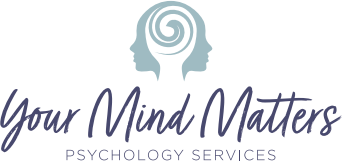Counselling For Depression
Sometimes we all feel down, anxious, and stuck; emotions are all part of being human. However, it's not something you should have to deal with all the time, which is where our team of psychologists can help.

What Is Depression?
Our lives are filled with ups and downs. We've all felt depressed after tussling with our teenage children, an argument with a loved one, or when we're dealing with a transition. On occasions, we can feel "down" for no obvious reason at all.
Sometimes a combination of events can cause us to feel sad, hopeless, or down, and recognising these signs is crucial. Especially when these depressive episodes start to get longer and longer, until we feel like they're never-ending.
Depression is a serious but common mental disorder that can negatively impact how you act, think, and feel. It can also affect how you perceive the world and your life.
A diagnosis of depression may be warranted when someone experiences certain symptoms (e.g. low mood) for most of their day, nearly every day, and for more than two weeks. There will also need to be a clear change in their day-to-day functioning.
What Does Depression Look Like?
Depression symptoms vary from person to person. They can range from mild to very severe. These symptoms can include feeling hopeless, sad, empty, or irritable, or thoughts about self harm. Some people may experience an increase in purposeless activity. This may include hand wringing, pacing, or inability to sit still. Others might deal with trouble remembering things, making decisions, concentrating, or thinking.
These symptoms might occur in patterns. For example, a person's depression might come when the seasons change.
It's not unusual for people to also have physical side effects of depression, such as digestive problems, an increased or decreased need to sleep, and changes to appetite.
Types & Symptoms of Depression and Other Common Mood Disorders – A Very Brief Overview
Major Depressive Disorder (MDD)
- Characterised by persistent and intense feelings of sadness for extended periods.
Symptoms: Loss of interest, fatigue, changes in sleep and appetite, feelings of guilt or worthlessness, and difficulty concentrating.
Persistent Depressive Disorder (Dysthymia)
- Depressed mood for most of the day, for more days than not, for at least two years.
- Presence of two or more of the following: poor appetite or overeating, insomnia or hypersomnia, low energy or fatigue, low self-esteem, poor concentration or difficulty making decisions, feelings of hopelessness.
Disruptive Mood Dysregulation Disorder (DMDD)
- Severe and recurrent outbursts that are out of proportion in intensity or duration to the situation.
- Outbursts are inconsistent with developmental level and occur three or more times per week.
- Persistent irritable or angry mood most of the day, nearly every day, between the temper outbursts.
Premenstrual Dysphoric Disorder (PMDD)
- Severe form of premenstrual syndrome (PMS) with marked mood disturbances.
- Symptoms such as mood swings, irritability, depressed mood, or anxiety, as well as physical symptoms, occur during the luteal phase of the menstrual cycle.
In addition to depressive disorder, many of our clients also experience changes to mood, which don’t fall under the category of “depressive” disorders. Here’s a few we often see:
Bipolar I Disorder
- Characterised by one or more manic episodes, which may be preceded or followed by hypomanic or major depressive episodes.
- A manic episode involves an abnormally elevated, expansive, or irritable mood, and increased goal-directed activity or energy, lasting at least one week.
Bipolar II Disorder
- Involves one or more major depressive episodes and at least one hypomanic episode.
- A hypomanic episode is similar to a manic episode but less severe and does not cause significant impairment in social or occupational functioning.
Cyclothymic Disorder
- Chronic, fluctuating mood disturbance involving numerous periods of hypomanic and depressive symptoms.
- Symptoms do not meet the full criteria for hypomanic episodes or major depressive episodes and persist for at least two years (one year in children and adolescents).
When Does Depression and Mood Dysregulation Become a Problem?
While feeling down is a common occurrence in life, there are times when depression can become problematic. This can include when:
- The low moods last for more than 2 weeks
- You’re losing interest in things that were previously enjoyable
- It’s interfering with your ability to function at home or at work
- You’re experience weight loss or gain weight
- There has been a change in your sleeping routine
- You’re experiencing feelings of worthlessness or hopelessness
- Your concentration is not what it used to be
- Experiencing having thoughts related to self-harm to suicide.
Our psychologists are highly skilled in various treatment options for depression. We'll work collaboratively with you using a range of practical and therapeutic techniques to improve your well-being.
What Can I Do About Depression?
Treating depression and mood disorders typically involves a combination of approaches, including psychotherapy, lifestyle changes, and sometimes medical intervention. The specific treatment plan may vary depending on the individual's symptoms, severity of depression, and personal preferences. Here are the main approaches to treating depression:
Cognitive Behaviour Therapy (CBT)
CBT is an evidence-based and highly effective psychotherapeutic approach that can treat depression symptoms. The idea behind CBT is that a person's behaviours, feelings, and thoughts are interconnected. Negative thought beliefs and patterns can result in problematic behaviours and emotional distress.
Our psychologists use CBT to teach our clients practical skills that challenge, identify, and modify certain behaviours and thinking. We work with our clients to create problem-solving techniques and coping strategies that address their current problems.
Schema Therapy
Schema therapy is rooted in CBT and offers a framework for healing and understanding long-term psychological issues. This type of therapy is effective at treating chronic depression.
Schema therapy addresses and identifies deep-rooted patterns that develop during childhood and continue to affect a person's thoughts, behaviours, and feelings in their adult life. These therapy sessions are focused on cognitive restructuring and emotional healing. Individuals will learn strategies like behavioural pattern breaking and talking with certain parts of themselves.
Interpersonal Therapy (IPT)
IPT is designed to treat depression with the idea that life events and personal relationships play a major role in the resolution and development of psychological distress. The goal of this therapy is to improve an individual's interpersonal relationships by reducing their depression symptoms.
Acceptance and Commitment Therapy (ACT)
ACT is intended to help people embrace their feelings and thoughts instead of feeling guilty for them or fighting them. Our team uses ACT to teach our clients how to use mindfulness strategies to help them accept certain experiences, and also identify their values and goals, so we know what you want to move towards.
Our psychologists are highly skilled in various treatment options for depression. We'll work collaboratively with you using a range of practical and therapeutic techniques to improve your well-being.
To learn more about different modalities of therapy, visit individual counselling.
How Our Process Works
Step One: Schedule an Appointment
We invite you to fill out our online contact form or call us at 03 9802 4654 to schedule an appointment. When you call, our administration team will work out the clinician best suited to supporting you. Our office is open Monday -Thursday 8am – 9pm, and Friday 8am – 3pm.
Step Two: Visit Our Notting Hill Location
After you have scheduled in an appointment, we’ll send you our online take forms, as well as a Welcome email which includes information about your clinician, a location map, your telehealth link (in case you can’t make it into our clinic) and links to our resources webpage and blog on what to expect during your first session.
Step Three: Get the Help You Deserve
We understand that it can be challenging to ask for help from a mental health professional. Remember, we’ve been studying for many years for the privilege to help you and guide you along the path to feeling better.
How Much Does Counselling Cost?
We recommend that you get a referral to meet with one of our psychologists so you can claim Medicare rebates. While the Australian Psychological Society's recommended fee is around $300 per consult, our fees vary from $220 to $280. You can make your payment at the time of your appointment via cash, credit card, or EFTPOS.




